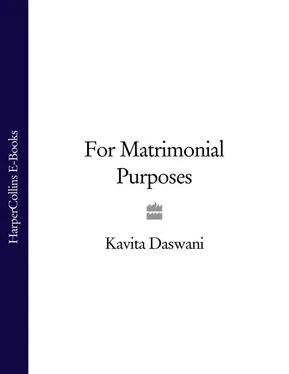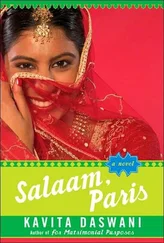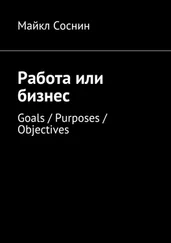For Matrimonial Purposes
KAVITA DASWANI
Copyright Copyright Dedication Part One Chapter One Chapter Two Chapter Three Part Two Chapter Four Chapter Five Chapter Six Chapter Seven Chapter Eight Chapter Nine Chapter Ten Chapter Eleven Chapter Twelve Chapter Thirteen Chapter Fourteen Chapter Fifteen Part Three Chapter Sixteen Chapter Seventeen Chapter Eighteen Epilogue Acknowledgment Keep Reading About the Author About the Publisher
This novel is entirely a work of fiction. The names, characters and incidents portrayed in it are the work of the author’s imagination. Any resemblance to actual persons, living or dead, events or localities is entirely coincidental.
HarperFiction
A division of HarperCollins Publishers Ltd. 1 London Bridge Street London SE1 9GF
www.harpercollins.co.uk
Copyright © Kavita Daswani 2003
Kavita Daswani asserts the moral right to be identified as the author of this work
A catalogue record for this book is available from the British Library
All rights reserved under International and Pan-American Copyright Conventions. By payment of the required fees, you have been granted the nonexclusive, nontransferable right to access and read the text of this ebook on-screen. No part of this text may be reproduced, transmitted, downloaded, decompiled, reverse engineered, or stored in or introduced into any information storage and retrieval system, in any form or by any means, whether electronic or mechanical, now known or hereinafter invented, without the express written permission of HarperCollins ebooks
HarperCollins Publishers has made every reasonable effort to ensure that any picture content and written content in this ebook has been included or removed in accordance with the contractual and technological constraints in operation at the time of publication
Source ISBN: 9780007160587
Ebook Edition © NOVEMBER 2012 ISBN: 9780007387908
Version: 2016-10-03
Dedication Chapter One Chapter Two Chapter Three Part Two Chapter Four Chapter Five Chapter Six Chapter Seven Chapter Eight Chapter Nine Chapter Ten Chapter Eleven Chapter Twelve Chapter Thirteen Chapter Fourteen Chapter Fifteen Part Three Chapter Sixteen Chapter Seventeen Chapter Eighteen Epilogue Acknowledgment Keep Reading About the Author About the Publisher
To Mummy and Papa,
for teaching me humor and humility.
To Sunita, Ranju, Sanam, Mansha and Sohana,
a family that I am profoundly proud to be a part of.
And especially to my exceptional husband Nissim,
who made me believe that my words have worth, and
our gorgeous son Jahan, who moved me to write as
he lay in my belly. As long as I have you both,
my life is blessed.
Cover
Title Page For Matrimonial Purposes KAVITA DASWANI
Copyright
Dedication
Part One
Chapter One
Chapter Two
Chapter Three
Part Two
Chapter Four
Chapter Five
Chapter Six
Chapter Seven
Chapter Eight
Chapter Nine
Chapter Ten
Chapter Eleven
Chapter Twelve
Chapter Thirteen
Chapter Fourteen
Chapter Fifteen
Part Three
Chapter Sixteen
Chapter Seventeen
Chapter Eighteen
Epilogue
Acknowledgment
Keep Reading
About the Author
About the Publisher
PART ONE
The normal religious marriage was and still is arranged by the parents of the couple, after much consultation, and the study of omens, horoscopes and auspicious physical characteristics … (w)hile a husband should be at least twenty a girl should be married immediately before puberty.
The Wonder That Was India by A. L. Basham
My grandmother was married off two days shy of her tenth birthday. My mother found a husband when she was twenty. I thus reckoned that if every generation increased by a decade the acceptable age for marriage, I should have become a wife by thirty.
But at thirty-three, I was nowhere close to being married. And it was this that brought much consternation to all, tainting the joy and inciting hitherto suppressed family politics, at the wedding of my twenty-two-year-old cousin, Nina.
I was at a family wedding in Bombay, the city where I was born and had spent most of my life. My parents and two brothers still lived here, in the same house that I knew as a child, a house conveniently located just minutes from major temples and hotels. Which was a good thing considering how much time they spent at such institutions, attending weddings just like this one. It was always, of course, someone else’s wedding and never my own.
Nina had ‘jumped the queue’ as they all liked to say. She was much younger, and marrying before me. But then, as Nina’s mother pointed out, how long could everyone wait?
I forced myself to smile and look happy. It wasn’t that I was unhappy. It was just that, on this steaming May evening, I was hot and flustered, conscious of the damp fog-grey semi-circles formed by droplets of sweat on the underarms of my sari blouse. I had to press my limbs down against my body so they wouldn’t show against the pale fabric. Both the sari and blouse were creamy whipped pink, like the pearly sheen of the inside of a seashell, or of little girls’ bows. Six yards of the fabric were wrapped, nipped and tucked around my body, making me look – in my estimation – like a blushing eggroll. At least that was what I told anyone who complimented me.
I had been fidgeting all evening with the flowers in my hair. They were faux , bought off a wooden stand on a Bombay street-corner, papery and the size of a fingernail, about a dozen of them pinned into my upswept coiffure. Not exactly my idea of understated chic. But the hairdresser had insisted: ‘Your cousin is getting married! You need some decoration!’
Thankfully understated wasn’t the order of the day here at the Jhule Lal Temple. Nina was about to become a wife in the presence of three hundred people, most of whom she had never met. I felt self-conscious standing there on the sidelines, the older, unmarried cousin, aware that people were glancing over at me – yes, to see what I was wearing, but mostly to detect any hint of pain or jealousy on my face as yet another younger cousin married. I closed my eyes for a second, inhaled, found my centre – the way they taught me to do at my Wednesday evening Hatha yoga class. Then, I lifted up my smile, and made it stay.
‘Your turn next,’ said Auntie Mona, my mother’s second cousin, who was standing next to me. She grinned, revealing a space between her two front teeth the size of East Timor. That gap was considered a sign of good luck. Any Indian face-reader worth his chapatti dinner knew that the wider the space, the greater the fortune. ‘Don’t worry, beti , it will be your turn soon,’ Auntie Mona consoled, patting me on the back. ‘God will listen to your prayers. It’s all karma. Tsk Tsk.’
I allowed her to comfort me, as I had learnt to do all these years, and noted how miraculous it was that my self-esteem wasn’t completely annihilated by now. Since arriving in Bombay a week ago, I had been on the receiving end of many things: advice, sympathy, concern. But mostly, it was pity and consolation. Now, coming from Auntie Mona, these sentiments were delivered with the same gravity as a diagnosis of Lyme disease. My relatives never thought to ask about my interesting and independent life in New York, what I did there, who my friends were, or whether I’d scored a ticket to The Producers while Matthew Broderick and Nathan Lane were still in it. Instead, it was an incessant: ‘Why aren’t you married yet?’
Читать дальше












